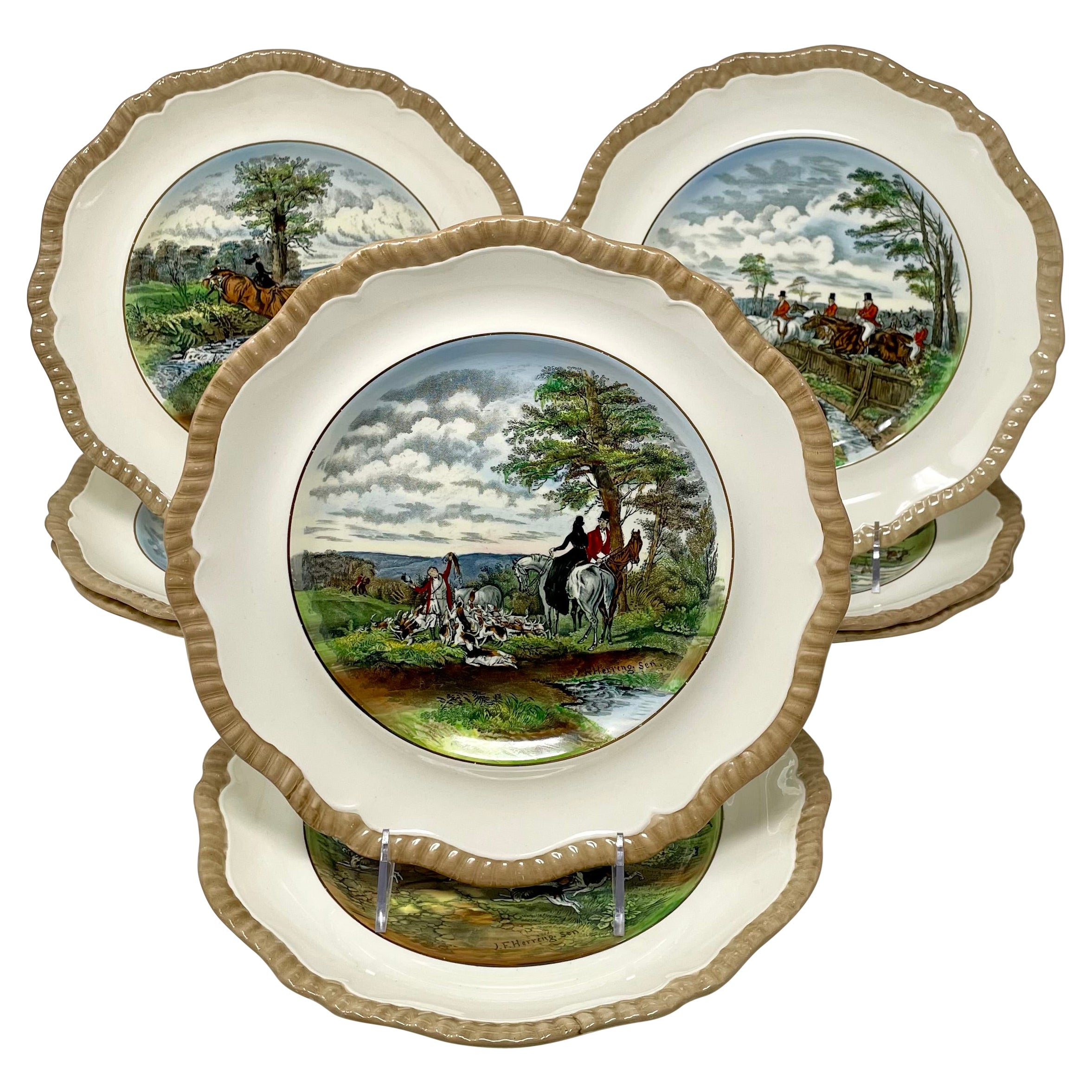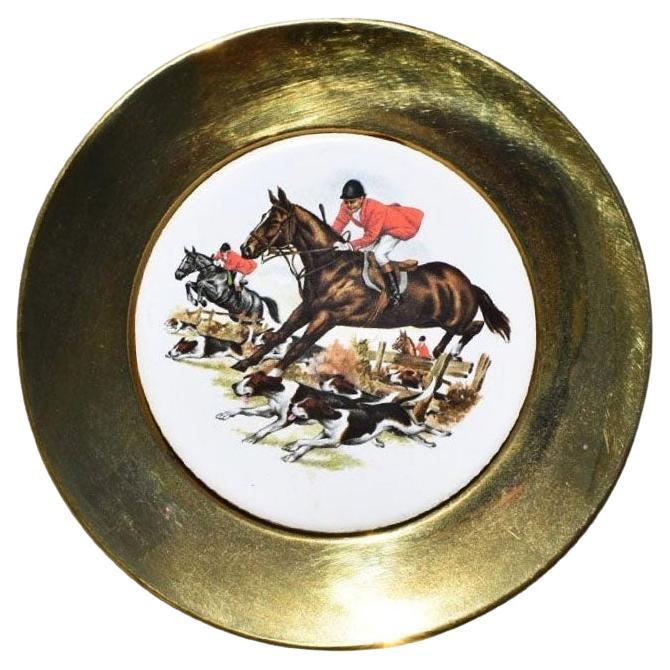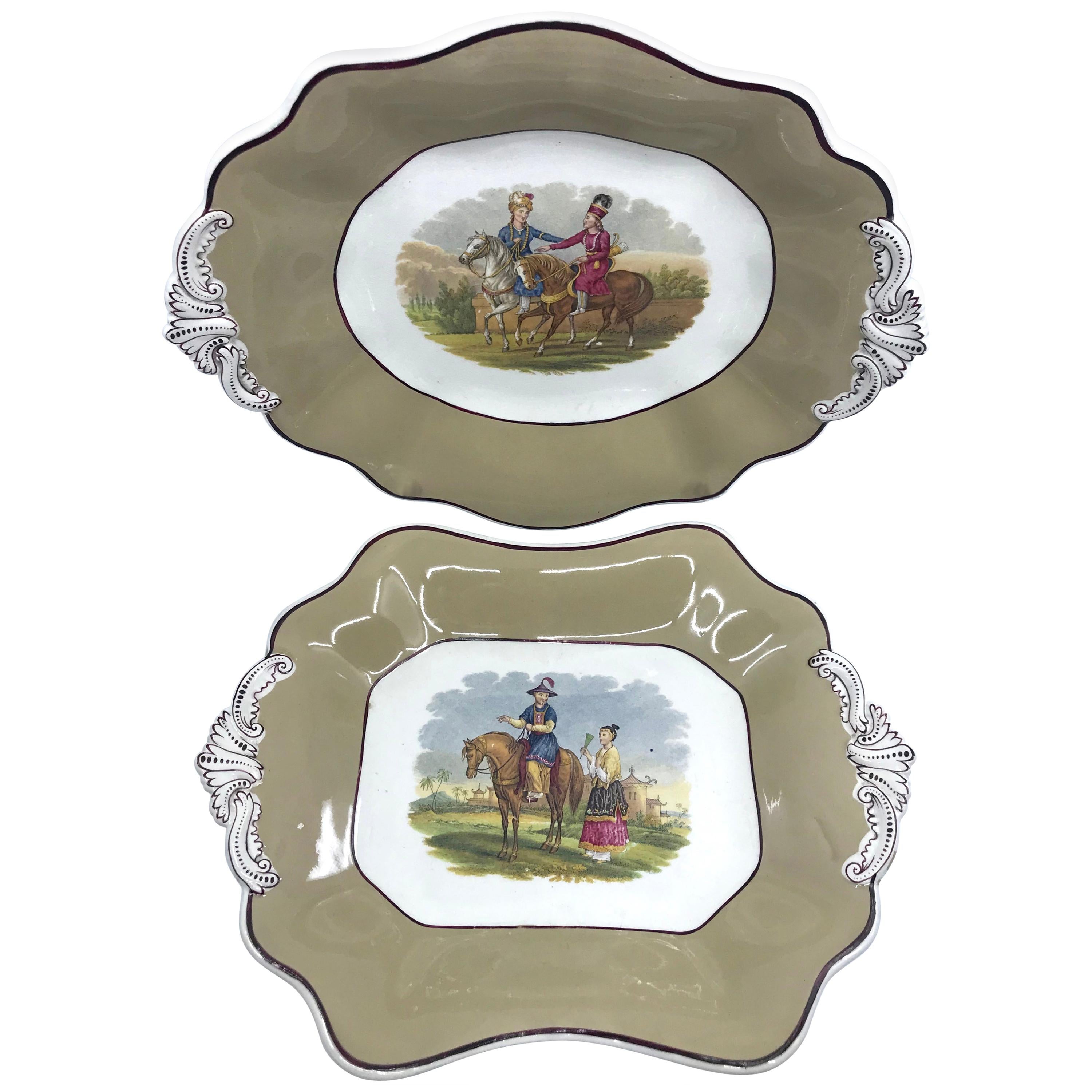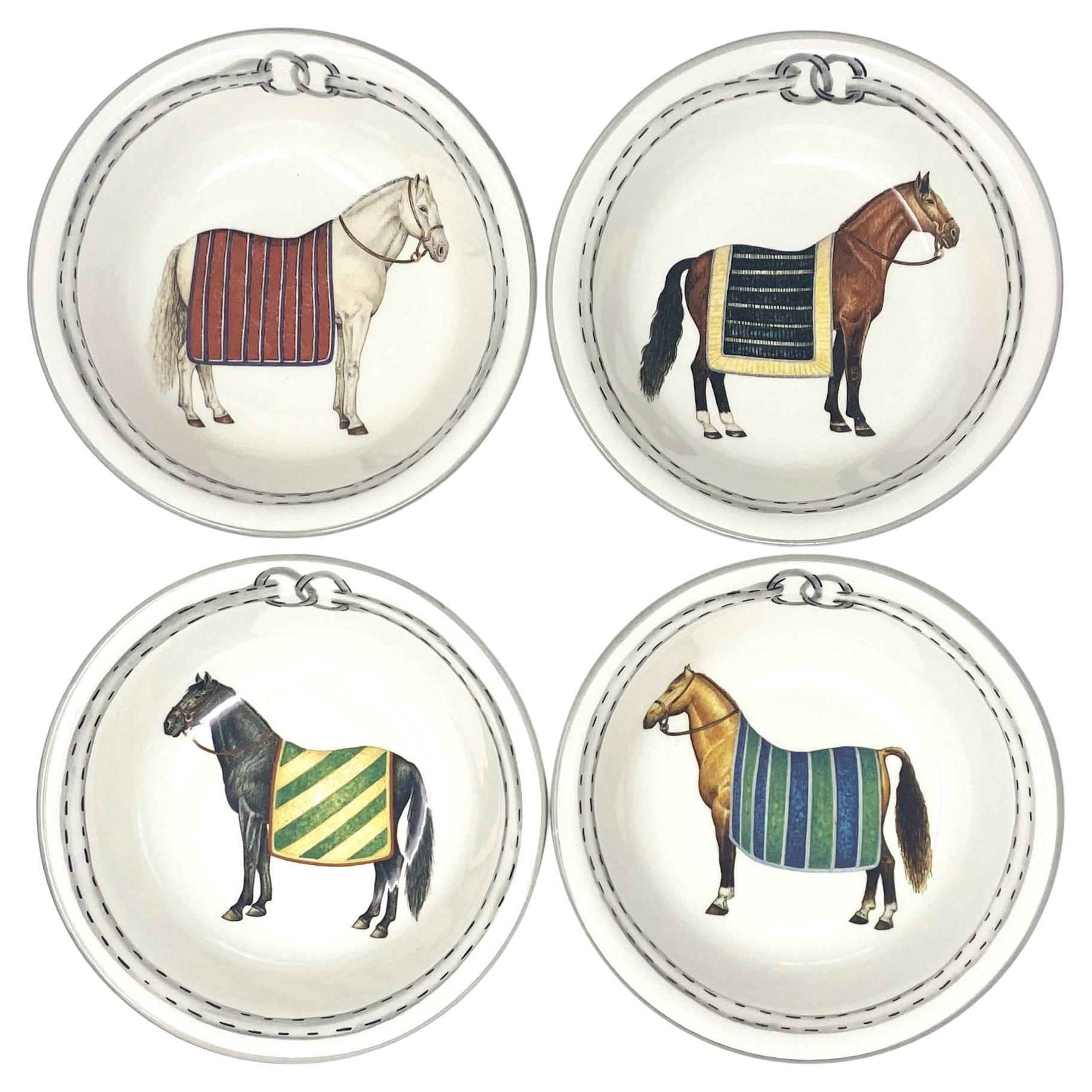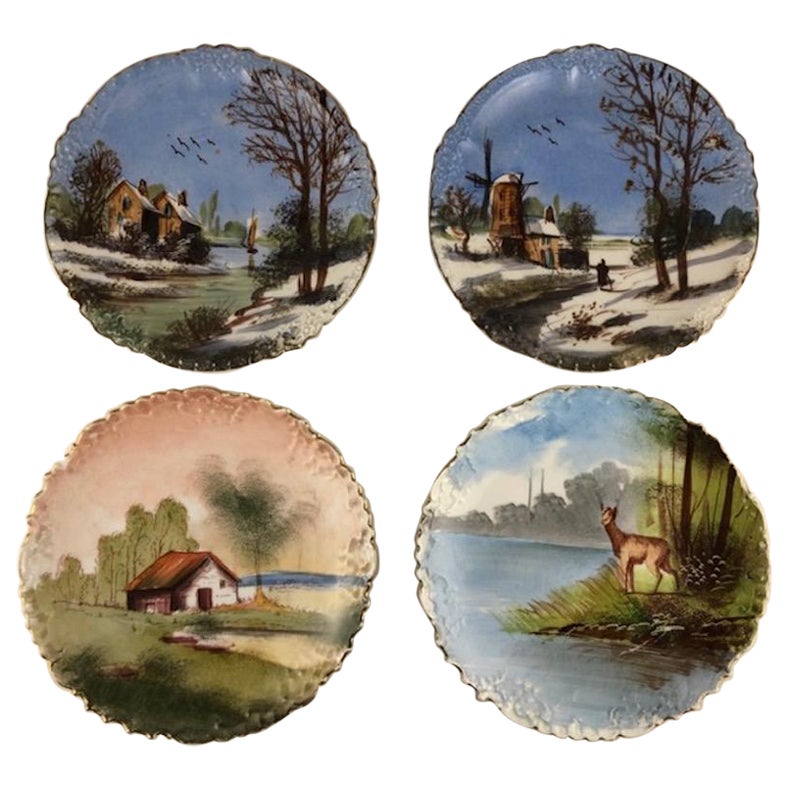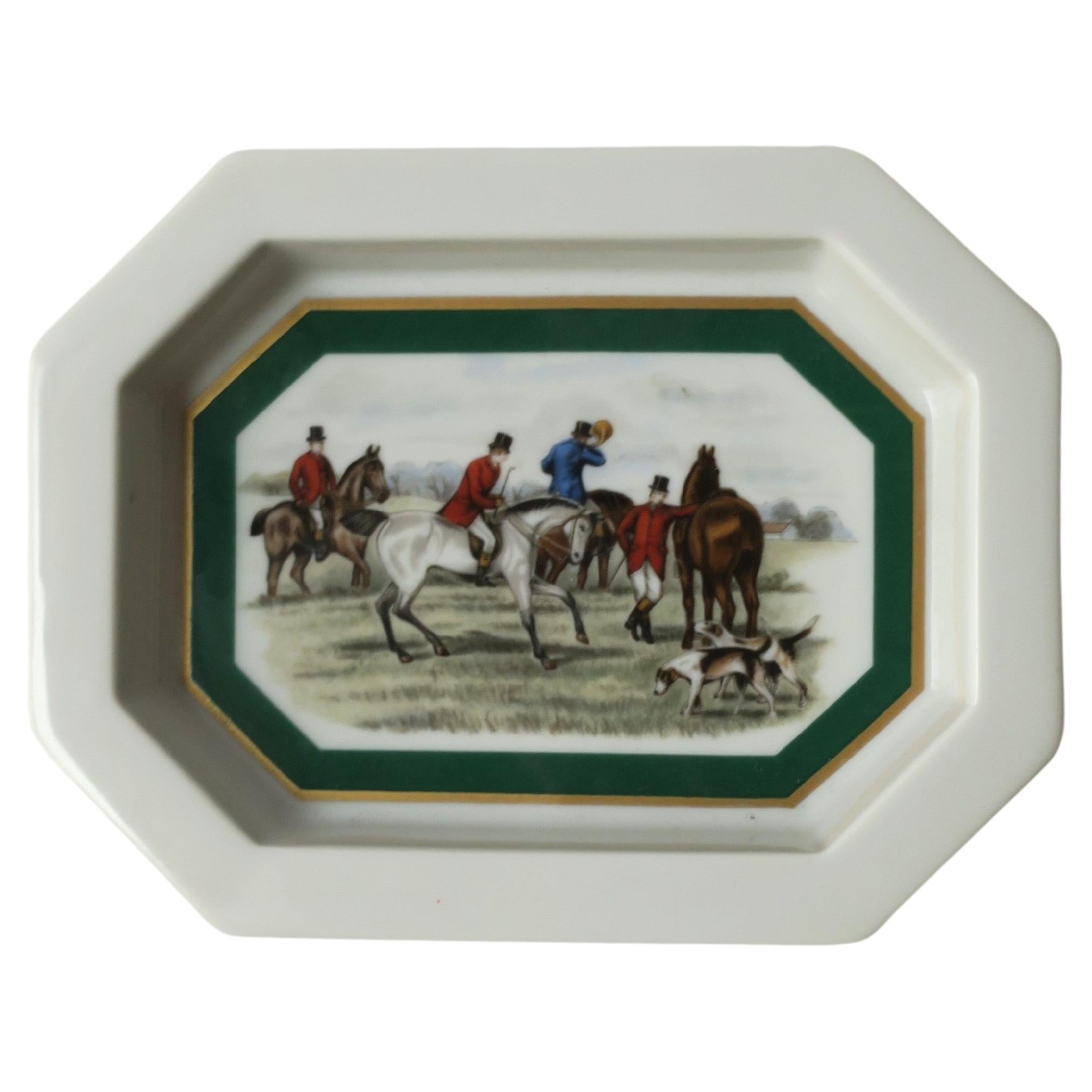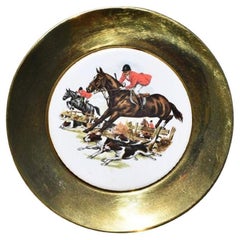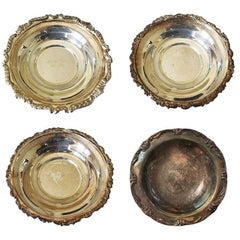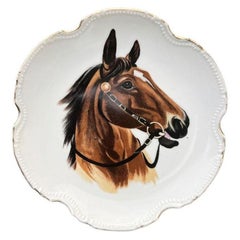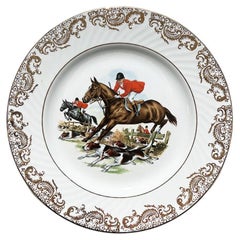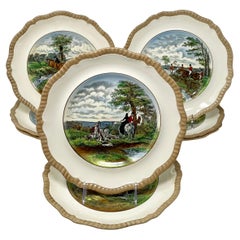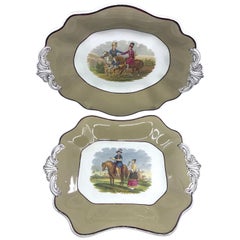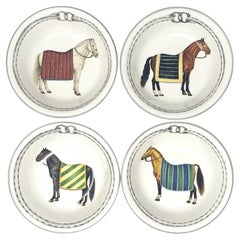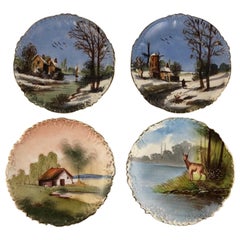Items Similar to English Traditional Scenic Equestrian Catchall Trinket Dishes, Set of 4
Want more images or videos?
Request additional images or videos from the seller
1 of 12
English Traditional Scenic Equestrian Catchall Trinket Dishes, Set of 4
$220per set
$275per set20% Off
£168.30per set
£210.38per set20% Off
€193.57per set
€241.96per set20% Off
CA$314.19per set
CA$392.74per set20% Off
A$346.32per set
A$432.90per set20% Off
CHF 178.95per set
CHF 223.68per set20% Off
MX$4,140.02per set
MX$5,175.03per set20% Off
NOK 2,251.13per set
NOK 2,813.92per set20% Off
SEK 2,115.75per set
SEK 2,644.68per set20% Off
DKK 1,445.77per set
DKK 1,807.22per set20% Off
About the Item
A set of four ceramic collectible trinket dishes with painted scenes.
“The Cornfield”
By John Constabl
1776-1837
Like Fen Lane, which hangs to the right, this study is thought to be one of the works Constable began outdoors in Suffolk in 1817, but did not finish. It too shows Fen Lane, but from further down.
When Constable was looking for a subject to work up for the 1826 Royal Academy exhibition, he turned to this canvas and from it painted the picture now known as The Cornfield (now in the National Gallery). It was probably while preparing the finished picture that he lowered the trees at the right of this earlier sketch by overpainting them with sky. (History courtesy of the Tate Organization)
The original is hanging in the National Gallery London
“Valley Farm”
By
John Constabl
1776-1837
This work shows a view of Willy Lott's House at Flatford from the River Stour. The farmer lived continuously in the same house for over eighty years and for Constable it came to represent an important part of the Suffolk landscape, a nostalgic symbol of the 'natural' way of life. The building features prominently in earlier works by Constable, including The Mill Stream (circa 1810, Tate N01816) and The Hay Wain (1820-1821, National Gallery, London).
The house is viewed through the cutting that led from the river Stour to the mill stream of Flatford mill. The composition is based on two earlier workings of the subject, The Ferry (1814, private collection) and, more particularly, Willy Lot's House from the Stour (1816-1918, private collection). A number of features are based on this second and slightly smaller version, including the timberwork in the left foreground, the figures on the far bank and the boat just beside it, the man at the gate and the tiny bird skimming the surface of the water. The most obvious additions to The Valley Farm are the ferryman, boat and female passenger (based on a study in the Victoria and Albert Museum, London), and the three cows that precede them, the last one turning its head to look up. The house has been modified and made to look grander with the addition of half-timbering on one side and some extra windows. The trees on the right of the picture are also larger, more expressive and more contorted than in earlier versions and there is a development towards looser and more expressive handling of paint. The surface of the canvas is heavily worked and Constable has applied flecks of white paint to bring the picture to life.
Constable devoted a large amount of time to reworking The Valley Farm, and there is, in this painting, a sense of the aging artist attempting to revive old images and past emotions. Constable himself was extremely enthusiastic about the results, but when the picture was exhibited at the Royal Academy in 1835 it was not well received and one critic wrote, 'He ought to be whipped for thus maiming a real genius for Landscape' (quoted in Parris and Fleming-Williams 1991, p.378). Nevertheless Constable sold the picture in the same year to the notable collector Robert Vernon (1774-1849) for his new house at 50 Pall Mall. Vernon paid him £300, the largest price Constable had ever received for a picture. It was later included in Vernon's gift to the National Gallery, London, in 1847. (History Courtesy of the Tate organization)
Some rubbing to the painting at the bottom left.
The original is hanging
In the
National Gallery
LONDON
“Crossing the Brook”
By
J.M.W. Turner
1755-1851
The original is hanging in the National Gallery London
Turner developed this painting of the Tamar valley from sketches he made in Devon in 1811 and 1813. His watercolors and drawings of the area were fresh and informal. Here he creates a more self-consciously artful image. This was meant to evoke the 17th century classical landscapes of French painter Claude Lorrain. The painting was exhibited in the year of the battle of Waterloo. Viewers at the time would have been alert to the patriotic subtext of such an imposing depiction of the British landscape. (History courtesy of the Tate Organization)
This dish does show some wear to the gold rim. Some rubbing away toward the top. But in otherwise fantastic condition.
“Winner of the Derby at Epsom Downs”
This English traditional style equestrian trinket dish is encircled in gold at it’s rim. The center depicts a rider in a red coat, white riding pants and green hat on horseback at the Epsom Downs. Under the horse it reads, “Gladiateur”.
Gladiateur (1862–1876) was a French Thoroughbred racehorse who won the English Triple Crown in 1865. Gladiateur is called a legend by France Galop and "One of the best horses ever to grace the turf in any century" by the National Sporting Library of Middleburg, Virginia. Gladiateur was not very successful as a sire but his performance on the track remains one of the most impressive in Thoroughbred horse racing history.
No signature.
Specifications for Each:
355 grams
4.75" diameter
.5" tall.
- Dimensions:Height: 0.5 in (1.27 cm)Diameter: 4.75 in (12.07 cm)
- Sold As:Set of 4
- Style:American Classical (In the Style Of)
- Materials and Techniques:
- Place of Origin:
- Period:
- Date of Manufacture:20th Century
- Condition:Wear consistent with age and use. Age-appropriate wear with some rubbing of the gold at the rims.
- Seller Location:Oklahoma City, OK
- Reference Number:1stDibs: LU3382321102512
About the Seller
4.9
Vetted Professional Seller
Every seller passes strict standards for authenticity and reliability
1stDibs seller since 2018
726 sales on 1stDibs
Typical response time: <1 hour
- ShippingRetrieving quote...Shipping from: Noble, OK
- Return Policy
Authenticity Guarantee
In the unlikely event there’s an issue with an item’s authenticity, contact us within 1 year for a full refund. DetailsMoney-Back Guarantee
If your item is not as described, is damaged in transit, or does not arrive, contact us within 7 days for a full refund. Details24-Hour Cancellation
You have a 24-hour grace period in which to reconsider your purchase, with no questions asked.Vetted Professional Sellers
Our world-class sellers must adhere to strict standards for service and quality, maintaining the integrity of our listings.Price-Match Guarantee
If you find that a seller listed the same item for a lower price elsewhere, we’ll match it.Trusted Global Delivery
Our best-in-class carrier network provides specialized shipping options worldwide, including custom delivery.More From This Seller
View AllEnglish Traditional Framed Ceramic and Brass Decorative Horse Plate or Catchall
Located in Oklahoma City, OK
An English Traditional ceramic equestrian horse plate with a brass frame. The ceramic plate in the center features a traditional hunt scene with three hors...
Category
20th Century American American Classical Decorative Dishes and Vide-Poche
Materials
Brass
$120 Sale Price
20% Off
Silver Plate Horse Race Engraved Decorative Bowls, Set 4
Located in Oklahoma City, OK
A beautiful collection of American Classical equine horse race trophy silver plate bowls. This beautiful set of 3 is from a variety of races from the...
Category
20th Century American American Classical Sheffield and Silverplate
Materials
Silver Plate
$400 Sale Price / set
20% Off
Traditional Round Ceramic Decorative Horse Plate
Located in Oklahoma City, OK
A timeless round ceramic decorative horse plate. This piece will be wonderful hanging on a wall, or used as a catchall or trinket dish on a coffee table. It has scalloped gold edges ...
Category
20th Century American American Classical Decorative Dishes and Vide-Poche
Materials
Ceramic, Paint
$120 Sale Price
20% Off
Traditional English Ceramic Hunting Plate by Barratts of Staffordshire England
By Staffordshire
Located in Oklahoma City, OK
A traditional English hunting plate by Barratts of Staffordshire England. This round ceramic plate will be a fabulous accent to a gallery wall. It is gl...
Category
20th Century English American Classical Ceramics
Materials
Ceramic, Paint
$120 Sale Price
20% Off
Ceramic Chinoiserie Vide Poche Decorative Dishes, Set of 4
Located in Oklahoma City, OK
A set of four pretty scalloped chinoiserie dishes. Each dish is slightly bowl-shaped and would be fabulous if used as a lemon dish at a place setting, or as...
Category
Early 20th Century Japanese Chinoiserie Ceramics
Materials
Ceramic, Paint
$200 Sale Price / set
20% Off
Ceramic Nippon Morimura Brothers Decorative Dish Vide Poche or Catchall, 1800s
Located in Oklahoma City, OK
A rare find, this decorative oval shaped Nippon catchall by Morimura Brothers is a fabulous example of early Japanese ceramics. A lovely ceramic dish for holding change or other items, it will be a fabulous chintz addition to any nightstand or foyer table. Highly decorated in bouquets of pink and yellow flowers, the center of the dish is the showstopper. A chinoiserie bird in flight with a pink breast and yellow, blue and green feathers takes center stage. Surrounding him are more bouquets of flowers and a single pink and blue bird. The rim of the dish is encircled with a blue ribbon adorned with intricately painted flowers such as white daisys and pink and yellow peonies. Two handles are at each end for carrying. The handles and the rim are both painted in gold.
The back stamp at bottom reads in green, “M-in-Wreath, hand-painted ("M" stands for importer,
Morimura Bros.); Nippon.”
Mark used since 1911.
The practice of painting of the word “Nippon” on ceramic bases began in 1891 in response to the U.S. McKinley Tariff Act, which forbade the import of items that weren’t “plainly marked...
Category
Antique Late 19th Century Japanese Chinoiserie Decorative Bowls
Materials
Gold
$520 Sale Price
20% Off
You May Also Like
Set of 8 Estate English Copeland Spode Porcelain Horse Plates After J.F. Herring
Located in New Orleans, LA
Set of 8 Estate English Copeland Spode Porcelain Fox Hunt Plates After J.F. Herring.
Each painting is different (with its coordinated marking on the back).
Category
20th Century English Dinner Plates
Materials
Porcelain
Pair Equestrian Serving Plates / Serving Dishes
By Spode
Located in New York, NY
Pair English exotic equestrian serving dishes. Pair mocha and Bordeaux banded and shaped serving dishes/trays centering two equestrian groupings; one with mounted ottomans in fancy d...
Category
Antique Early 19th Century English Porcelain
Materials
Porcelain
$1,150 / set
Devon Equestrian Small Bowls S/4, Made in Italy
By Nove, Italy
Located in West Chester, PA
Equestrian Small Bowls, Set of 4. Each bowl features a unique blanketed horse. Made in Italy for The Mane Lion.
The Mane Lion was born in 1979 in the he...
Category
2010s Italian Tableware
Materials
Ceramic
Set of 4 Victorian Style Decorative Plates with Landscape Scenes
Located in Miami, FL
Set of 4 Victorian style decorative plates made using decade old traditions.
Measures: Diameter 9.75 in. x Height 1 in.
These decorative plates would enhance any wall or shelf.
Category
20th Century American Victorian Decorative Objects
Materials
Porcelain
Horse Scene Porcelain Jewelry Dish
By Ralph Lauren, Gucci
Located in New York, NY
A porcelain jewelry dish with equestrian horse scene, circa mid-20th century, Europe, most likely England, however piece is unmarked. An octagonal je...
Category
Mid-20th Century European Decorative Dishes and Vide-Poche
Materials
Porcelain
Four antique Royal Copenhagen porcelain bowls with hand-painted landscapes.
Located in København, Copenhagen
Four antique Royal Copenhagen porcelain bowls with hand-painted landscapes and gold decoration.
Museum quality. Early 19th century....
Category
Antique Early 19th Century German Porcelain
Materials
Porcelain
More Ways To Browse
Ceramic Catchall
Pall Mall
Ceramic Trinket
English Equestrian
Vintage Thoroughbred
Lane Mid Century Dining Set
Battle Of Waterloo
Riding Hat
Furniture By By Lane Virginia
Waterloo Battle
Lane Mid Century Bedroom Set
Used Traditional Dining Room Sets
Vintage Riding Pants
Royal Crown Derby Tree Of Life
Art Deco Vide Poches
Trinket Dish
Ceramic Brown Dishes
Japanese Decorative Plates
